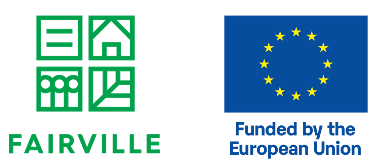Fairville - Facing Inequalities and democratic challenges through Co-production in Cities
European collective programme - Cluster 2: Culture, Creativity and Inclusive society
Project sponsor: Aix-Marseille University (MESOPOLHIS Laboratory)
MESOPOLHIS scientific managers: Claire Benit and Magali Nonjon
Funding: project funded following the call for proposals HORIZON-CL2-2022-DEMOCRACY-01-03 - The impact of inequalities on democracy.
If the link between inequalities and declining levels of trust in the political institutions of democracy in Europe has already been shown, the various ways in which both citizens and institutions are trying to face these inequalities and (re)build a sustainable common future remain somewhat under-documented. Indeed, this lacuna becomes even more pronounced when one considers those attempts that go beyond conventional forms of state-led participation. Responding to this gap, the aim of Fairville is to both document and propose pilot models of urban intervention that engage local academics, -authorities, -community-based organisations, -residents and -users in the collective improvement of deprived urban neighbourhoods via a deepening of resident and user participation in new and existing democratic processes. The idea that urban policies should not be made "for" populations but rather "with" them is a potentially profound engine of social transformation and empowerment. However, the realisation of such co-production processes is often marked by epistemic inequalities and unequal power relations. Cognisant of this issue, the Fairville pilot cases all place an emphasis on exploring the ways in which academic researchers, local communities and local authority representatives can work together to reduce the power and information asymmetries that exist between them. Clustered around three major themes - environmental inequalities, inequalities related to housing and urban planning and inequalities related to climate risks - and ranging from co-diagnosis to co-planning and intervention, the pilots will be carried out as action research and include the implementation of observation, capitalisation and co-evaluation mechanisms. The results of these pilot cases will be widely disseminated to the institutions and citizens concerned and we will work collectively to encourage policy transfer and outreach.
Members of the consortium
---
FRANCE
CNRS
AMU
UNIVERSITY PARIS 8 VINCENNES SAINT-DENIS
Alternatives for urban projects here and abroad
A Town Centre For All
GERMANY
TECHNISCHE UNIVERSITAT BERLIN
ICLEI EUROPEAN SECRETARIAT GMBH (ICLEI EUROPASEKR)
BELGIUM
COMMUNE OF IXELLES
FREE UNIVERSITY OF BRUSSELS
Etats Généraux de l'Eau in Brussels
UNITED KINGDOM
UNIVERSITY COLLEGE LONDON
Just Space
OTHER COUNTRIES
ASOCIATIA FRONTAL (Romania)
CONOSCENZA E INNOVAZIONE SOCIETA ARESPONSABILITI (Italy)
NORTH-SOUTH CONSULTANTS EXCHANGE LLC (EG)
ICLEI-LOCAL GOVERNMENTS FOR SUSTAINABILITY-AFRICA (ZA)
PERIFEREIA ATTIKIS (Greece)
Sineterismos Ergazomenon COMMONSPACE (EL)
